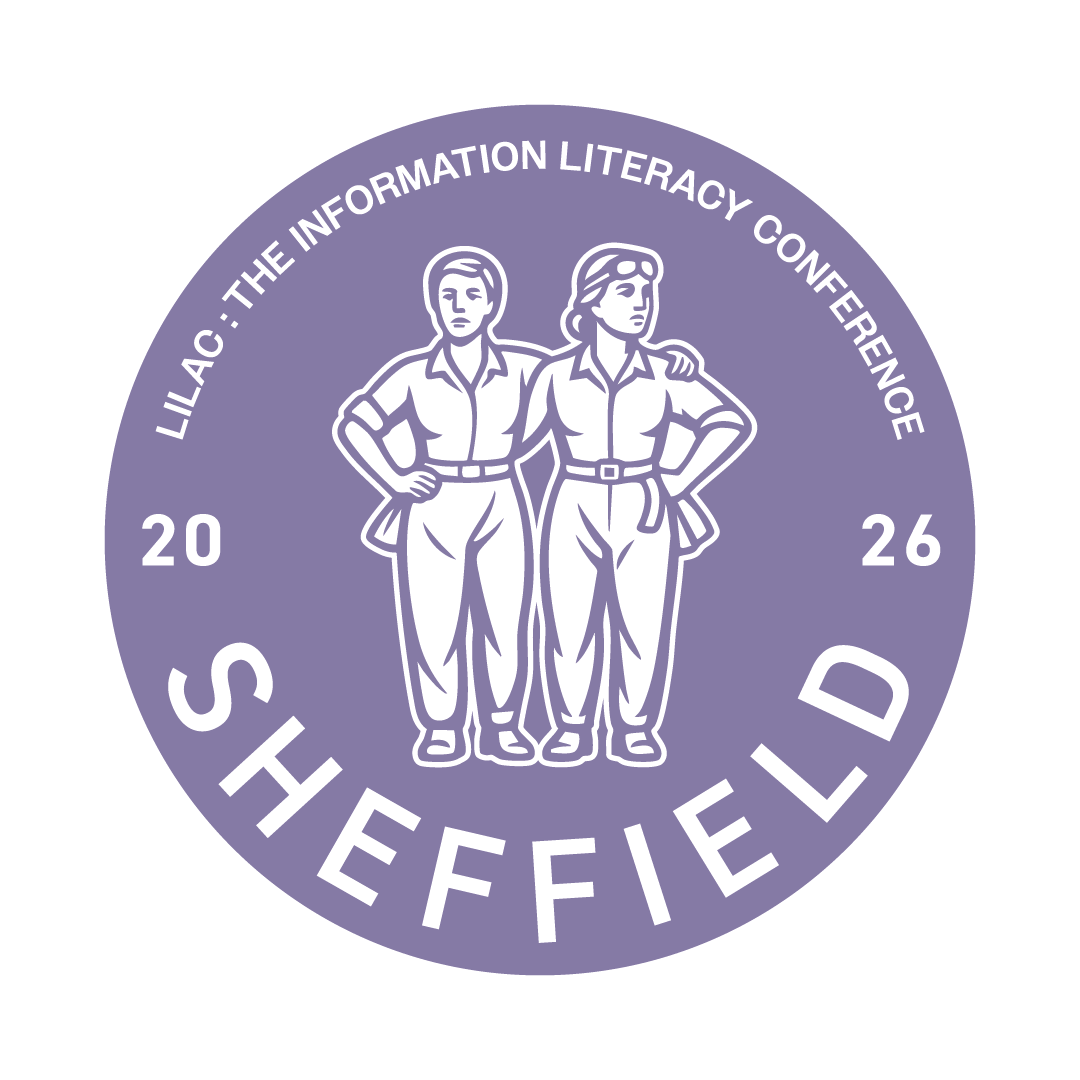
Select the keynote speaker to view their biography details:
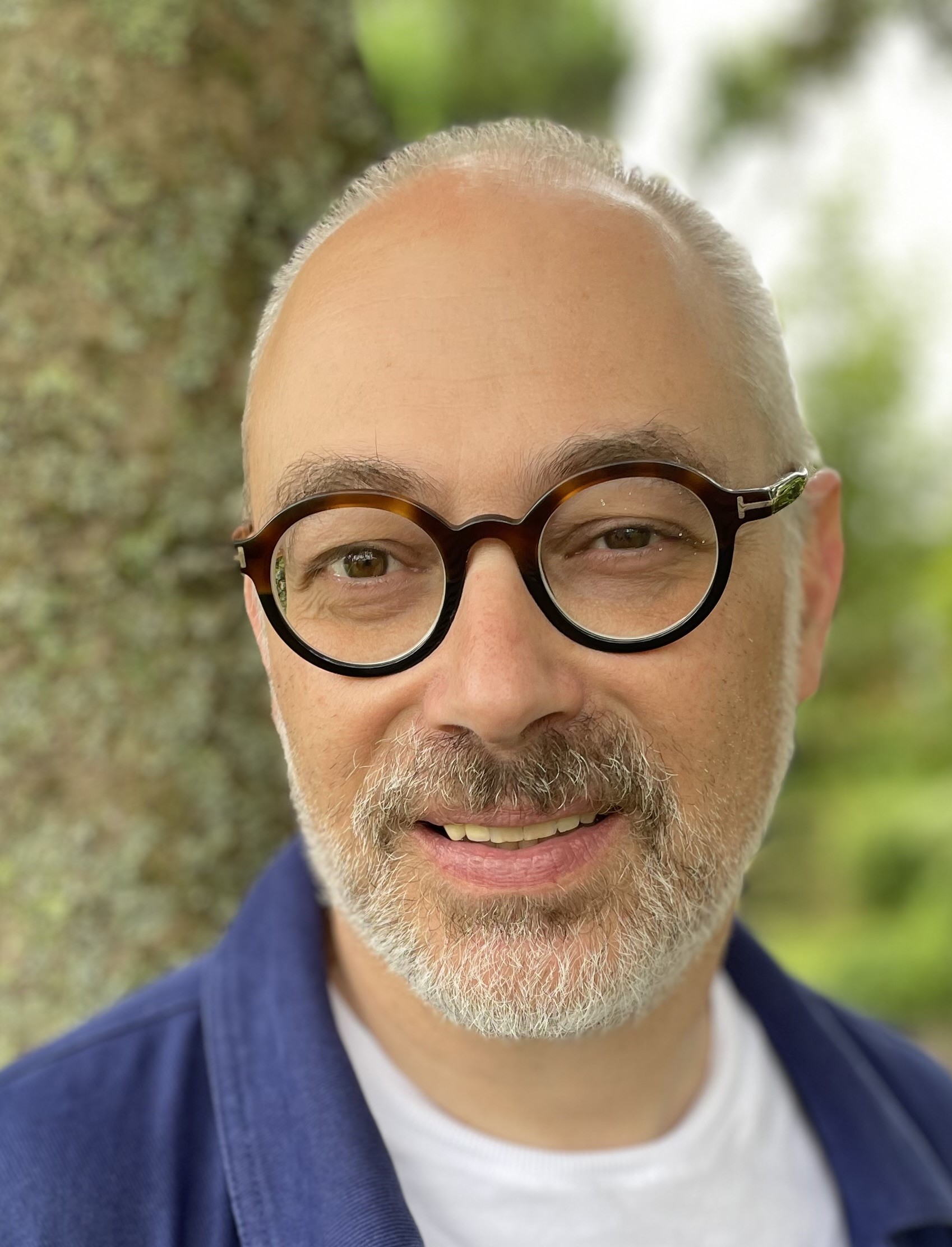 Biography
BiographyDr Stephen Thornton is Reader in Politics at Cardiff University. Though he mainly teaches and researches on aspects of British political history and public policy, Stephen also has a long-standing interest in the information behaviours of Politics and International Relations students and, over two decades, has written many articles on the topic. His latest piece - co-written with Dr Doug Atkinson - is called ‘Everywhere and Nowhere: Information Literacy in the Political Science Classroom’ (in the US journal PS: Political Science and Politics). Stephen is also a Senior Fellow of Advance HE (formerly the Higher Education Academy).
Looking back over some of my earliest articles in which I described attempts to embed information literacy into a Politics classroom at a UK university, I discovered – with some alarm – that I’ve been doing this for two decades. One yellowing report outlines a small pilot study conducted back in February 2005, where, for the first time, I knowingly dipped my toe into your world. I did this through organising – in collaboration with a very patient information specialist – a small third-year undergraduate workshop which took the issue of the UK government’s response to the foot-and-mouth crisis (remember that?) as the focus around which to explore the reliability of various sources. The hot topic back then was the dependability of Wikipedia. Happy days.
This was just the start of many such adventures, and this talk provides an excellent opportunity to take stock of two decades’ worth of attempts to get the discipline of Politics and International Relations to take information literacy seriously. As I will explain, despite the support of some fantastic colleagues along the way, the discipline paid little heed to me, nor the many others making similar points. However, recent developments suggest that may be changing – at last.

Jane Secker is Associate Professor in Educational Development at City St George’s, University of London where she leads the modules related to digital education and digital literacies and is joint Programme Director of the Masters in Academic Practice. She is the former Chair of the CILIP Information Literacy Group, a co-founder of LILAC and now serving as Deputy Chair of the ILG. She is founder member and a trustee of the Media and Information Literacy Alliance (MILA) and created a framework for information literacy known as a New Curriculum for Information Literacy (ANCIL) in 2011 working with Emma Coonan. Her current research is exploring staff attitudes towards digital literacies and open educational practices, copyright anxiety in higher education and why staff engage in playful learning.
Jane was Copyright and Digital Literacy Advisor at LSE for over 15 years where she advised staff about copyright issues and the online environment. She is a member of the Universities UK Copyright Negotiation and Advisory Committee which negotiates with the Copyright Licensing Agency on the higher education licence. She is co-author of Copyright and E-learning: a guide for practitioners published by Facet in 2016. She has created a number of open educational games for teaching about copyright, collaborating with Chris Morrison for over 10 years. She also runs the podcast Copyright Waffle with Chris and has a PhD from Aberystwyth University. You might think Jane is a very serious person but in fact in her spare time she is a passionate gardener and is learning the guitar. She also enjoys playing with her cats and dressing up in historical costumes.
In this keynote, I will reflect on information literacy teaching and research over the past 25 years that I have been working in higher education. I am a passionate advocate for information literacy, as a founding member of the CILIP Information Literacy Group and a co-founder of LILAC over 20 years ago. I’ll discuss some of what motivated me to help establish the IL community. I helped to re-write the CILIP (2018) definition of IL, inspired by UNESCO’s Alexandria Proclamation of IL that positions it as the cornerstone of lifelong learning and a fundamental human right (IFLA, 2006). Like Paul Zurkowski (1974), I believe in the importance of ‘universal information literacy’ to empower people in their work and in their daily lives, however achieving this in 2025 sometimes seems harder than ever. In all my work, collaborating and sharing ideas with colleagues has been central though, we can’t do it alone, and to paraphrase the words often attributed to Isaac Newton from 1675, it’s only by standing on the shoulders of giants that we can see further.
In the keynote I will share a series of lessons about information literacy, each illustrated by a cultural reference which include the words of a great scientist, the titles of songs or films that I love. Making learning engaging is the heart of what I try and do and so using this playful approach I hope to make some serious points. I will also draw on my experiences of running projects, undertaking research and more recently of trying to teach staff about information and digital literacy from both a practical and theoretical perspective. And it wouldn’t be a keynote by me without me mentioning the importance of copyright!
The premise that all you need are ten lessons or ‘life hacks’ to understand how to be a teaching librarian or a researcher in information literacy comes from the likes of BuzzFeed. However, one thing that working in the field of information teaches us is that there are never just ten things you need to know about anything, there are always competing ideas and new research emerging. One must always take a critical approach to identify misinformation, fake news or over generalisations and simplifications of what are often highly complex issues. And as more content is created, increasingly by AI, there has never been a more important need for information literacy for everyone in their daily lives. But how on earth do we instil critical thinking in people at all stages of their life? I’ll share some thoughts about what actually works and has impact on people’s lives.
Given my origins as a historian, I’ll return to the idea that we need to stand on the shoulders of giants in the IL field and use evidence to inform our approach. We also need to reflect on where IL comes from so that we can make progress. If you continue to work in this field, the one thing you need to remember is nothing stands still, you will always need to keep learning, and you will never get to a state of being what Zurkowski called the ‘information literati’. But this is work that can make a difference and maybe change lives, as education is supposed to do, so I urge you never to give up trying!
CILIP (2018) Definition of Information Literacy. Available at: https://www.cilip.org.uk/news/421972/what-is-information-literacy.htm
IFLA (2006) High-Level Colloquium on Information Literacy and Lifelong Learning Bibliotheca Alexandrina, Alexandria, Egypt November 6-9, 2005. Report of a meeting by Sarah Devotion Garner. Available at: https://www.ifla.org/wp-content/uploads/2019/05/assets/information-literacy/publications/high-level-colloquium-2005.pdf
Zurkowski, P (1974) The Information Service Environment: Relationships and Priorities. Washington D.C.: National Commission on Libraries and Information Science.
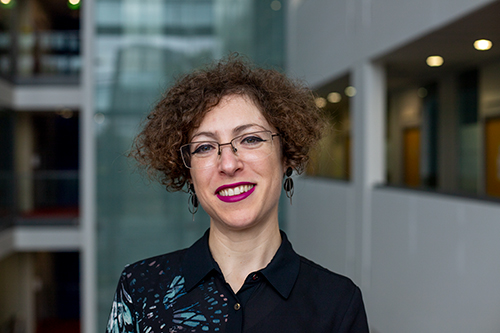
Dr. Elinor Carmi is a digital rights advocate, feminist, researcher and journalist who has been working on data politics, data literacies, data feminism, data justice and internet governance. In the past five years she has successfully won grants from UKRI, ESRC, and Nuffield Foundation together with colleagues from academia and NGOs. Dr. Carmi's work contributes to emerging debates in academia, policy, health organizations and digital activism. In February 2020, Elinor was invited to give evidence on digital literacy for the House of Lords Committee on Democracy and Digital Technologies. Her insights were included in the final report: “Digital Technology and the Resurrection of Trust”. In July 2020, Dr. Carmi was invited by the World Health Organization as an expert on data literacy and disinformation to the first scientific discussion on infodemiology. Between 2021-2023 Elinor won a Parliamentary Academic Fellowship working with the UK's Digital, Culture, Media & Sport Committee, and from May 2024 she has been selected to be an Expert Member of the UK Information Commissioner's Office Technology Advisory Panel. She has been invited to be an expert advisor for several organisations and digital rights NGOs such as: Amnesty International Tech, International Federation of Library Associations and Institutions (IFLA), UNESCO, Connected by Data, Demos, 5 Rights, Royal Society, and the Norwegian Consumer Ombudsman.
This talk explores what literacies people need to challenge Big-Tech companies. People have become more aware of power imbalances, specifically regarding the ways Big Technology companies (referring to organizations such as Facebook/Meta, Amazon, Apple, Google/Alphabet) use and abuse their data. However, while people get glimpses of the harms these companies cause through the media, many feel powerless against them, and therefore the awareness does not always translate into action. In this talk I will examine how awareness can be transformed into meaningful action. I draw on the Data Citizenship framework I developed with colleagues from Liverpool University that looks beyond functional actions and understanding and aims to equip people with civic knowledge about their data rights and participatory practices in the datafied society.
Erin Nephin (Chair) - Library Academic Support Team Manager, Leeds Beckett
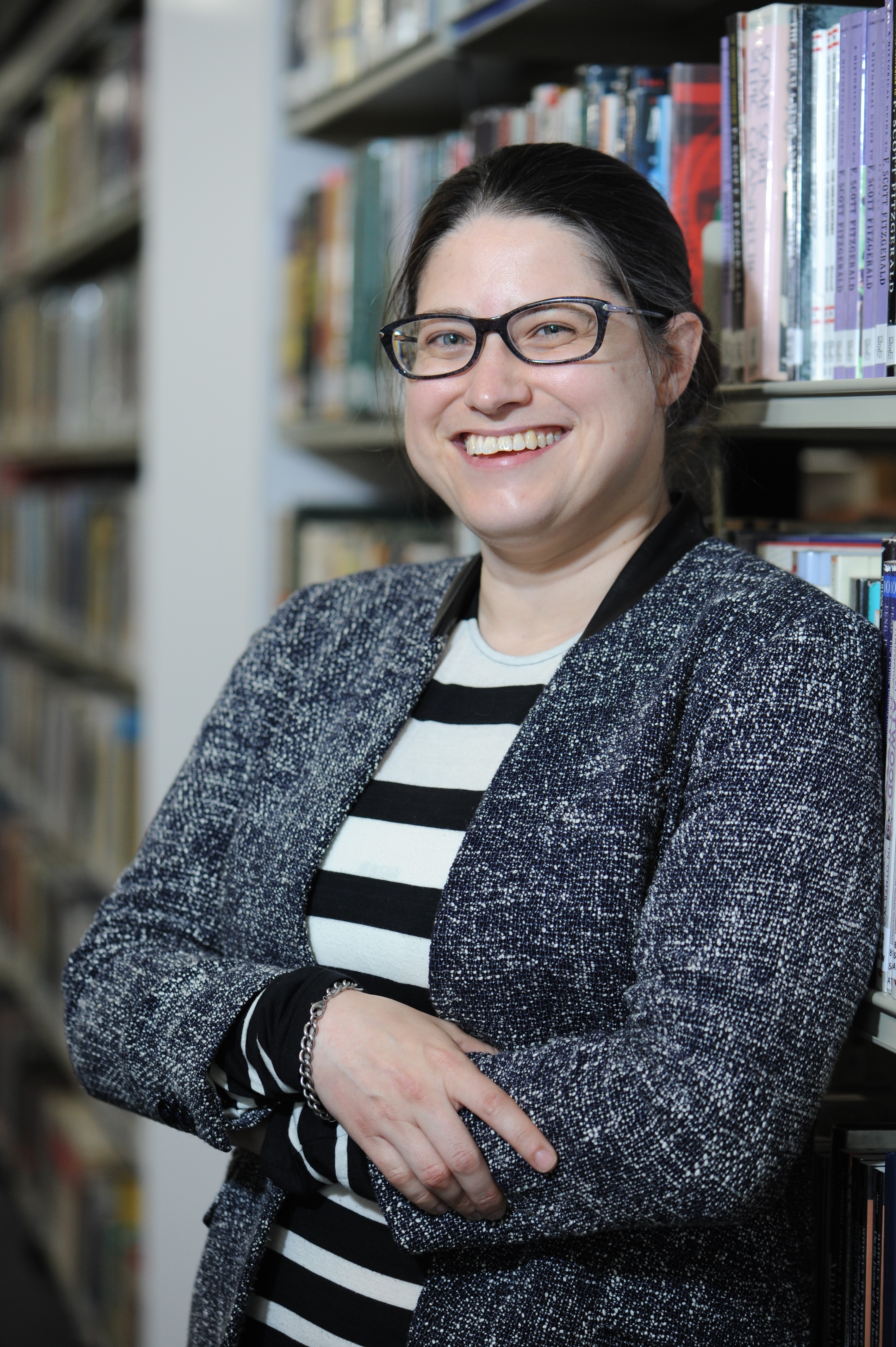
Erin Nephin (pronounced “knee-fin”) currently works as a Library Academic Support Team Manager at Leeds Beckett University. As a result of her role supporting academic integrity, she has been heavily involved in the development of student guidance around the responsible and ethical use of generative artificial intelligence tools across the university.
She is particularly interested in how current discussions around the use of artificial intelligence in learning might be harnessed to strengthen information and digital literacy skills for all members of an institution and provide opportunities for wider collaboration, including those who may not be directly involved in teaching.
Sam Thomas - Knowledge and Library Services Manager at University Hospitals Dorset NHS Foundation Trust
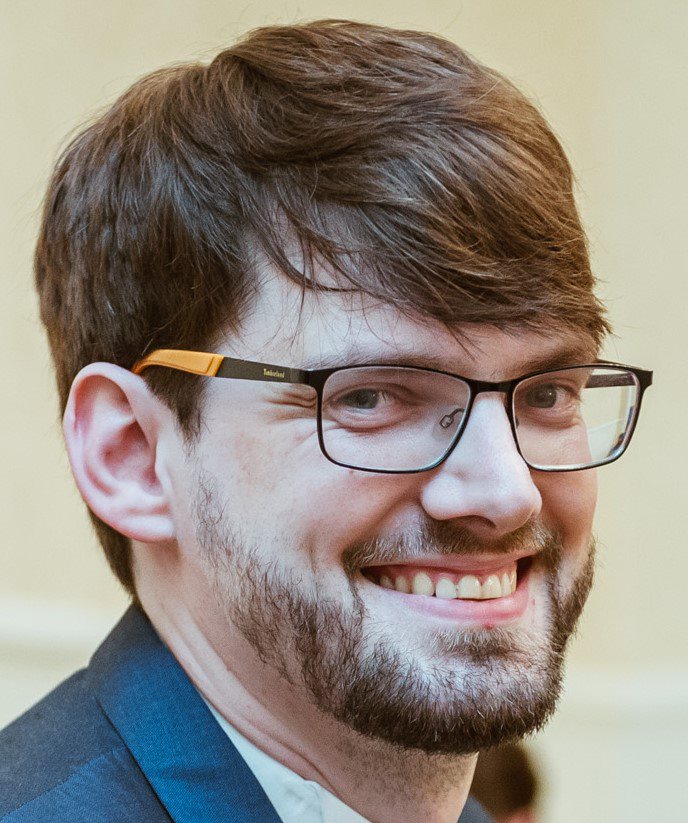 Sam Thomas is the Knowledge and Library Services Manager at University Hospitals Dorset NHS Foundation Trust. He has previously worked for the UK Health Security Agency and Bournemouth University. Sam has a clinical healthcare background, having trained and worked as an Orthoptist in the NHS prior to moving into a career in librarianship in 2017.
Sam Thomas is the Knowledge and Library Services Manager at University Hospitals Dorset NHS Foundation Trust. He has previously worked for the UK Health Security Agency and Bournemouth University. Sam has a clinical healthcare background, having trained and worked as an Orthoptist in the NHS prior to moving into a career in librarianship in 2017.
His professional interests include the exploration and implementation of AI and associated technologies in the health libraries sector. He is a committee member of the IFLA Artificial Intelligence Special Interest Group.
Josh Rodda - Learning Development Librarian at the University of Nottingham/ILG New Professionals Sub-committee
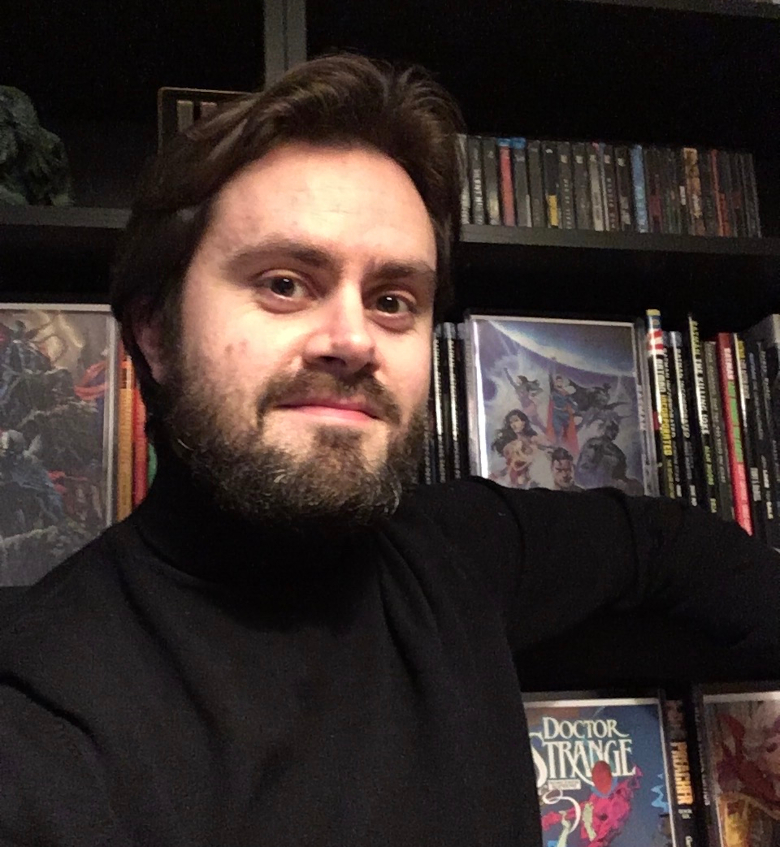
Josh co-created Nottingham's student-facing guide to AI in Higher Education, and he has since designed and led sessions on AI for postgraduate Arts and PGCHE students.
Masud Khokhar - University Librarian and Keeper of the Brotherton Collection, University of Leeds
.jpg) Masud is the University Librarian and Keeper of the Brotherton Collection at the University of Leeds. A computer scientist by education, and with libraries in his DNA, Masud is passionate about digital leadership and innovation in the changing library and archive environments.
Masud is the University Librarian and Keeper of the Brotherton Collection at the University of Leeds. A computer scientist by education, and with libraries in his DNA, Masud is passionate about digital leadership and innovation in the changing library and archive environments.
His core interests include strategic development, digital transformation, open research, and inclusive leadership. Masud is also Chair of Research Libraries UK (RLUK) and a firm supporter of diversity embedded in our thinking and practice within libraries and collections.
Martin Wheatley - Deputy Head of Digital Innovation + ilearn, Leeds City College
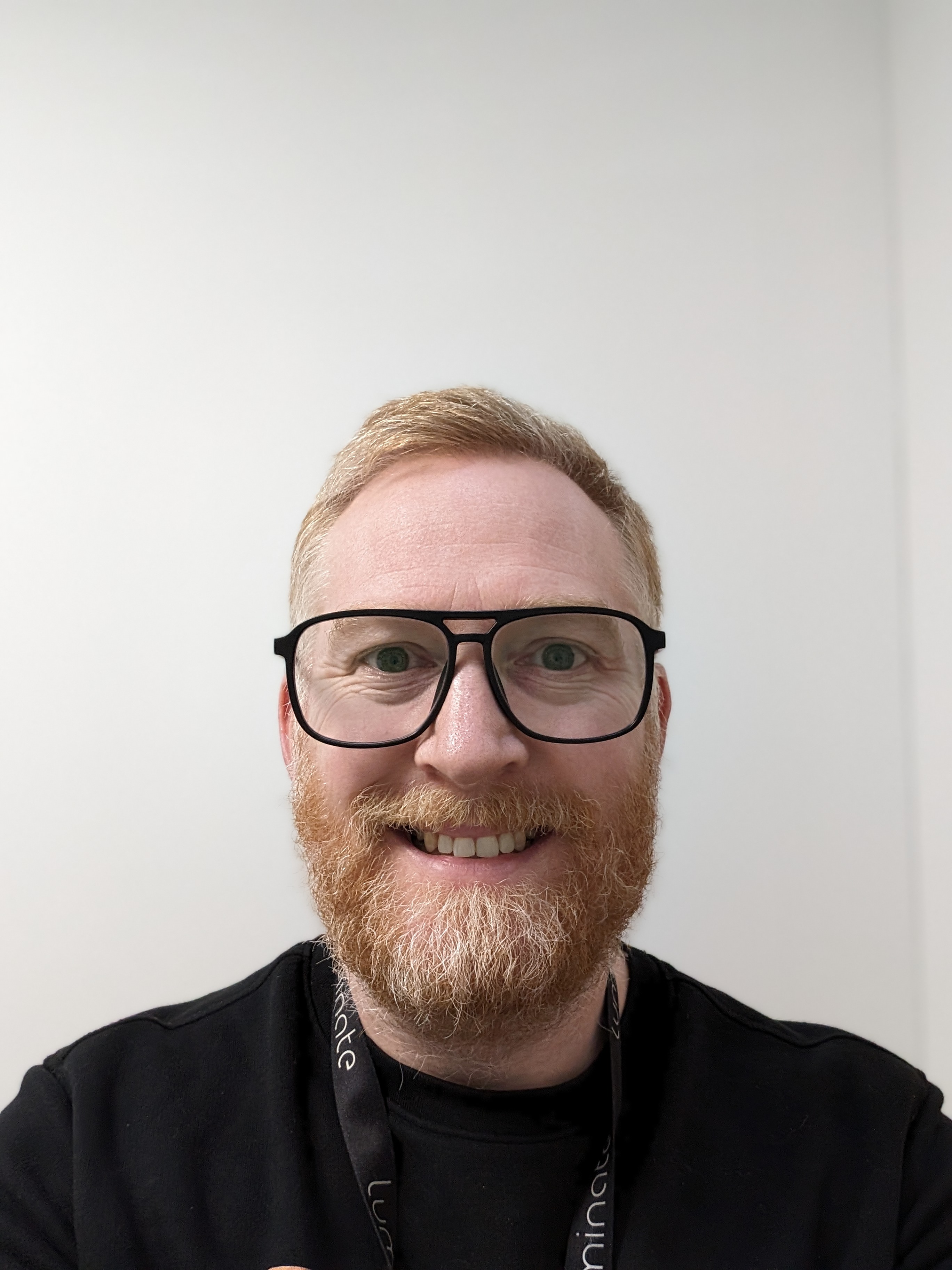 Martin is a passionate educator with nearly 20 years of experience in Further Education. His career has taken him from a Subject Librarian to Deputy Head for Digital Innovation and Independent Learning. Across these roles Martin has delivered Information Literacy support whilst also experiencing and overseeing significant digital transformation within his team and organisation.
Martin is a passionate educator with nearly 20 years of experience in Further Education. His career has taken him from a Subject Librarian to Deputy Head for Digital Innovation and Independent Learning. Across these roles Martin has delivered Information Literacy support whilst also experiencing and overseeing significant digital transformation within his team and organisation.
Martin is particularly interested in the impact and opportunities presented by AI. His current role is focused on investigating, implementing and supporting the application of AI within Luminate Education Group. Currently, he is collaborating on the development of various pilot programmes that support the AI initiatives within Luminate Education Group, aiming for beneficial integration across the organization.
Since the launch of ChatGPT in late 2022, it feels like artificial intelligence (particularly, generative artificial intelligence) finds its way into every discussion. With the speed that these technologies are developing, how do we ensure that our communities are equipped with the information literacy skills to understand and harness the opportunities that these tools offer?
In this keynote, colleagues in a variety of roles will discuss how the sudden swell in interest around artificial intelligence is providing opportunities and challenges for teaching, learning, and research. With a focus on information literacy, panellists will consider what the future might look like alongside these emerging technologies. Will these technologies change the landscape permanently or are they only another internet fad?
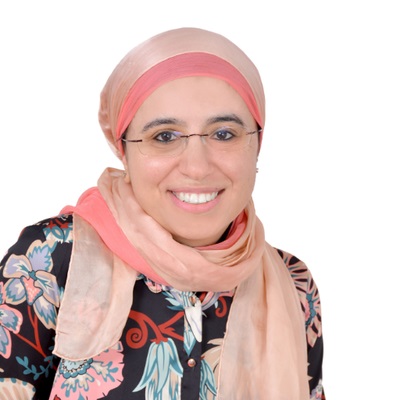 Biography
BiographyMaha Bali is Professor of Practice at the Center for Learning and Teaching at the American University in Cairo. She has a PhD in Education from the University of Sheffield, UK. She is co-founder of virtuallyconnecting.org (a grassroots movement that challenges academic gatekeeping at conferences) and co-facilitator of Equity Unbound (an equity-focused, open, connected intercultural learning curriculum, which has also branched into academic community activities Continuity with Care, Socially Just Academia, a collaboration with OneHE: Community-building Resources and MYFest, an innovative 3-month professional learning journey). She writes and speaks frequently about social justice, critical pedagogy, and open and online education. She blogs regularly at http://blog.mahabali.me and tweets @bali_maha.
In this interactive session, participants will explore ways of teaching various dimensions of Critical AI Literacy in a fast-changing landscape. Participants will be encouraged to reflect on appropriate metaphors that help educators and learners better understand discuss AI, and experience some activities on how metaphors may be used in the classroom to help develop critical AI literacy. We will suggest a compassionate approach to discussing AI with students. We will also explore various activities to help learners understand how AI works, uncover the inequalities within AI development and use, and support learners in distinguishing why, when, where and how AI may be useful versus detrimental to them. Participants will be encouraged to benefit from and share existing resources on teaching with and about AI.
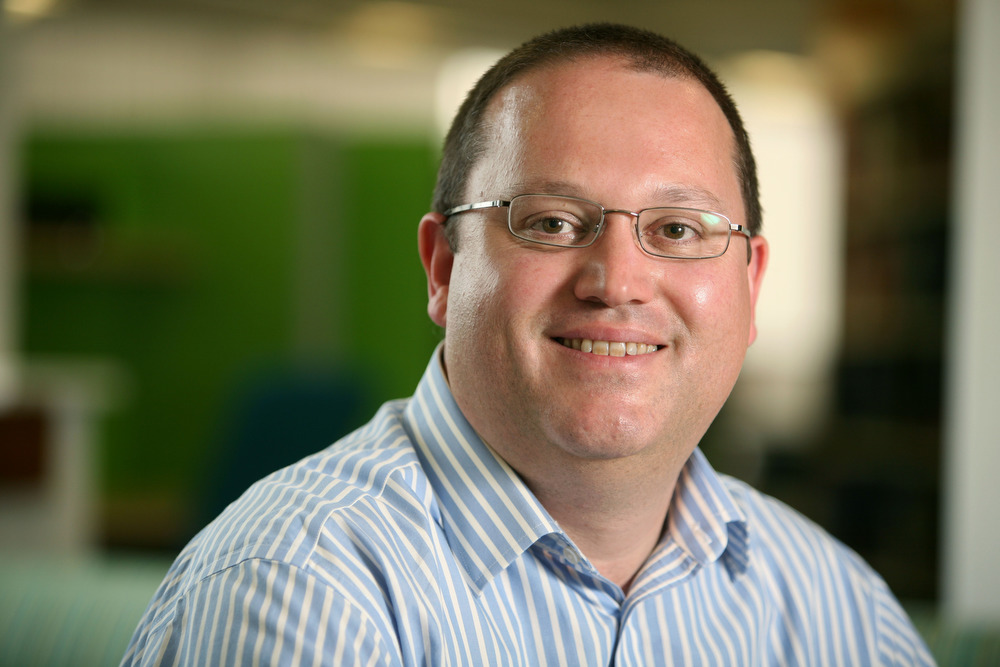 Biography
BiographyAndrew is a Neurodivergent National Teaching Fellow, librarian, and trainer. He is currently Development Manager for Academic Libraries North, in addition to running freelance workshops and training on topics such as teaching, leadership, and neurodiversity, normally with a focus on playfulness or play. He’s written and edited many things on information literacy, play, teaching, leadership, neurodiversity and fairy tales including books and journal articles; together with setting up and running the diamond open access Journal of Play in Adulthood. Amongst other awards, he was winner of LILAC’s own IL award in 2012! Currently trying to help build supportive networks for neurodiverse library workers alongside editing a book of their experiences. He can be found occasionally blogging, but mainly on Bluesky (as Playbrarian) or Mastodon.
Playful approaches to teaching, especially for one-shot teaching of information literacy sessions, are often thought of being primarily about fun, engagement, and making a session more memorable. There are however, often other, deeper layers behind playful approaches to teaching IL and these approaches can also be about compassion, or love. The point of Information Literacy instruction in Higher Education itself can be seen in different ways, perhaps along a spectrum including “do what the lecturer asked” (obeying authority), and “supporting students to meet their information needs in the best way for them” (contextual support given with love). Some of us may tend more towards one end of that spectrum than the other, especially people like myself who both embrace the shifting power dynamic inherent in playful approaches, and have a typical neurodivergent, especially autistic, tendency to resist blindly bowing to authority figures. This talk will outline one neurodivergent librarian’s view of playful learning, compassionate pedagogies, and how these link to information literacy instruction.
 Naomi Cassidy
Naomi CassidyNaomi Cassidy currently works as a Subject Support Librarian for the College of Health, Science and Society at the University of the West of England. Naomi graduated in November 2022 after completing a graduate traineeship program: she has a background in healthcare, with professional experience in both academic and health care libraries. Her professional interests include accessibility, inclusive hiring practice and supporting diversity in the student body. She is currently involved in her university’s “decolonising the library” working group.
 Tom Peach
Tom PeachTom Peach (he/him) is currently Academic Services Manager at York St John University, having been the Arts and Linguistics librarian for several years prior which came via a training position. Tom’s work focuses on teaching and learning, equity and developing accessibility practice, and currently mentors and assesses teaching and learning Fellowship applicationsfor Advance HE. He is currently working on developing sought-after trainee roles, as well as widening the access to teaching and learning development opportunities for library workers.
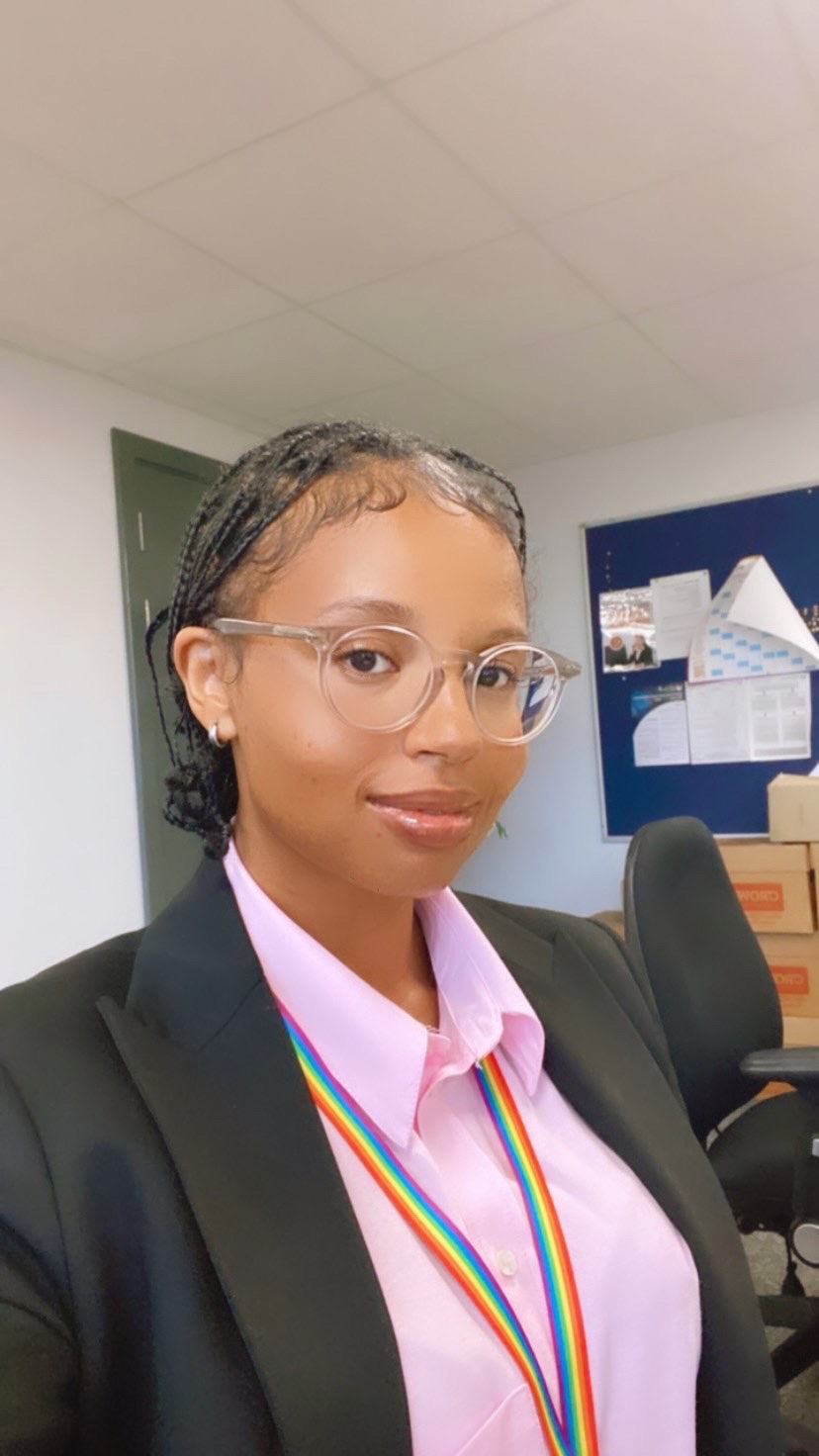 Naomi Smith is a Critical Librarian who was formally recognised in 2019 by IFLA and the Goethe Institute as an #EmergingInternationalVoice for her work in digital innovation. Drawing from her MA degree in Race and Resistance from the University of Leeds, she applies Critical Race Theory, Foucouldian discourse, Black Digital humanities and other critical theories to digital and pedagogical librarianship. Her most recent work in this area was on digital inequality with Research Libraries U.K. (RLUK) and is being prepared for publication. Since graduating from the LIS MA course at UCL in September 2022, she works at University of West London as a subject librarian, where she applies her critical praxis to teaching Law, Policing and Criminology. She teaches Global Black Studies, Youth Studies and Youth Justice.
Naomi Smith is a Critical Librarian who was formally recognised in 2019 by IFLA and the Goethe Institute as an #EmergingInternationalVoice for her work in digital innovation. Drawing from her MA degree in Race and Resistance from the University of Leeds, she applies Critical Race Theory, Foucouldian discourse, Black Digital humanities and other critical theories to digital and pedagogical librarianship. Her most recent work in this area was on digital inequality with Research Libraries U.K. (RLUK) and is being prepared for publication. Since graduating from the LIS MA course at UCL in September 2022, she works at University of West London as a subject librarian, where she applies her critical praxis to teaching Law, Policing and Criminology. She teaches Global Black Studies, Youth Studies and Youth Justice.
 Kristabelle Williams is the Learning Resource Centre Manager at Addey and Stanhope School in London and was awarded UK School Library Association's School Librarian of the Year 2021 for her “unremitting and consistent focus on ensuring the best futures for her students, making reading, research and library use the norm”. For her MA in Library and Information Studies from UCL she researched how school librarians are supporting the delivery of the Extended Project Qualification, and has delivered talks to library workers and educators on a wide range of issues including using technology to improve literacy; extra-curricular provision in school libraries; negotiating with management; and censorship and childrens’ rights. Leading and collaborating on Reading for Pleasure, Literacy and Information Literacy are her key areas of work, with a focus on young people's equality of access to books and information.
Kristabelle Williams is the Learning Resource Centre Manager at Addey and Stanhope School in London and was awarded UK School Library Association's School Librarian of the Year 2021 for her “unremitting and consistent focus on ensuring the best futures for her students, making reading, research and library use the norm”. For her MA in Library and Information Studies from UCL she researched how school librarians are supporting the delivery of the Extended Project Qualification, and has delivered talks to library workers and educators on a wide range of issues including using technology to improve literacy; extra-curricular provision in school libraries; negotiating with management; and censorship and childrens’ rights. Leading and collaborating on Reading for Pleasure, Literacy and Information Literacy are her key areas of work, with a focus on young people's equality of access to books and information.
Information literacy instruction plays a key role within most areas of librarianship today. However, institutional and professional differences in the perceived value of information literacy, self/perceptions of the teaching role of the librarian, and access to training, technology and resources can present barriers to involvement in information literacy instruction (Crary, 2019; Johnson & Tawfik, 2022). In addition, information literacy teaching can perpetuate existing educational inequalities such as racism, ableism and other forms of cultural oppression (Leung & López-Mcknight, 2020; Peach and Tuke 2021; Fold, 2019). This panel asks four new professionals to reflect on both constraints and enablers to advancement within information literacy instruction, including their own educational and professional journey and the learners they work with. In doing so, we hope to start a conversation about how the profession can start to address current and historic inequities as well as to celebrate successes in the field.
In advance of the live panel, the panel will provide a pre-recorded video to introduce themselves, their work, and their relationship to and experiences of information literacy teaching and education, and equity. Attendees will be invited in advance of the conference to submit discussion questions around barriers to or success in teaching , developing information literacy and critical cultural issues around Equity and inclusion. These questions will guide the direction of the live discussion panel.
 Biography
BiographyMaria King currently works as the Subject Librarian for the School of Health and Social Care at Edinburgh Napier University.
Maria also leads on inclusion work within the library around accessibility, particularly on improving teaching practices for accessibility, overall library support for neurodivergent students, and web accessibility. Maria has delivered workshops on these topics for both library, wider professional services, and academic staff at both at her current and previous institutions, and has presented at both the LILAC and International Network of Inclusive Practices (INIP) conferences. Maria is neurodivergent herself and brings this live experience to her work in this area.
Accessibility – what does it mean for libraries and education?
When you hear the word accessibility what initially comes to mind? What aboutaccessibility in relation to libraries and education? How about how neurodivergent users in particular are impacted by accessibility, and their accessibility needs?
Accessibility is a broad area that in relation to education and libraries can cover access to and use of spaces, service design, access to and use of resources, digital accessibility and technologies, document design, and accessible approaches to teaching.
Neurodivergent is a term that can be defined to mean people whose neurotype differs from those considered to be neurotypical, with all neurotypes sitting under the umbrella term of neurodiversity (Verywell Mind). Neurodivergent is an umbrella term itself that can be used when referring to, but not limited to, autism, ADHD, dyslexia, dyspraxia, dyscalculia, Tourette’s, OCD and more.
This keynote speech will touch on some of the key accessibility issues impacting educational settings and libraries, with a particular focus on accessibility in the context of neurodivergency. It aims to encourage attendees to more consciously assess and explore your own personal accessibility practices and those of your workplace, in order to improve accessibility practices.
 Biography
BiographyRegina Everitt is Assistant Chief Operating Officer (ACOO) & Director of Library, Archives and Learning Services at the University of East London. She began her professional career as a technical author/trainer working with computer companies that developed software for the manufacturing, pharmaceutical and financial sectors in the US and UK. After managing a small library at a university in West Africa as a volunteer with the United States Peace Corps, she transitioned into the HE sector developing and managing libraries, social learning spaces, and other learning resources. At University of East London, she is institution lead on excellence in customer service delivery.
Concerned about the low representation of Black, Asian and other marginalised ethnic staff members in leadership positions in academic libraries, she co-project managed SCONUL research to document BAME staff experiences in LIS with a view to working with the sector to develop more diverse talent. She now leads a SCONUL committee to support member institutions in implementing the recommendations from the report. She is also a member of the British Library Council, a past member of the Steering Group of the M25 Consortium of Libraries as well as a member of a CILIP trailblazer group that is developing a standard for a Level 6/7 apprenticeship. She co-edited a book called Narrative Expansions: Interpreting Decolonisation in Academic Libraries which considers how academic libraries are navigating this contentious topic.
Pivot ponderings: Musings about one library's role in supporting tech-enhanced learning
Like many teams in UK education institutions, University of East London (UEL did a rapid pivot to fully online delivery at the start of lockdown in March 2020. The institution had been on a gentle journey toward active blended learning prior to the start of the pandemic with some services like Library, Archives, and Learning Services (LALS) well placed to accelerate the pivot online. As restrictions were lifted, physical buildings re-opened, and staff and students returned to campus, the institution progressed from online delivery to dual delivery to technology-enhanced, active learning (TEAL). Did staff and students even know what this all meant and that a transition was taking place?
Then in October 2022, the Office for Students (OfS) released its regulation on blended learning outlining its expectations about how institutions should deliver learning and teaching in hybrid modes. This talk attempts to unpack these terms and considers the practical application from the perspective of the UEL library leader.
Reflecting on the services delivered by the team since the start of the pandemic, the speaker considers what went well, lessons learned, and areas for development. Key areas of critical reflection are about how well the diverse UEL student and staff populations were served considering digital literacy and accessibility, equity and inclusion, and the changing profile of UEL due to the increase in international students. Finally, the speaker considers the role of library services in working alongside the wider institution to meet the conditions of the OfS regulation on blended learning.
 Biography
BiographyEmily Drabinski is Critical Pedagogy Librarian at the Graduate Center, City University of New York. She has published and presented widely on topics related to critical information literacy, queer theory and knowledge organization, and the importance of organized labor and collective struggle. Drabinski edits Gender and Sexuality in Information Studies, a book series from Library Juice Press/Litwin Books.
As library workers and teachers, what do we know about information that our students don’t? We know that information is organized and that understanding these ordering infrastructures is crucial for retrieval and use. We know that knowledge structures, not just knowledge itself, is power. And these systems are what we know best: who makes them and how, what they describe, their capacities and their limits. Drawing on current research into the development and application of alternative library classification and cataloging schemes, this talk argues that attention to these technical aspects of the library work can transform the classroom.
 Biography
BiographyMarilyn Clarke is Director of Library Services at Goldsmiths, University of London. She’s a member of the Goldsmiths HR and Equalities Committee, the Goldsmiths Racial Justice Strategic Board, and, co-Chair of the Race Equality Charter Self-Assessment Team, as well as co-Chair of the Goldsmiths Race Equality Group (BAME staff network).She is a member of the SCONUL Board, and a member of the CILIP BAME Network.
She leads the Liberate our Library Working Group at Goldsmiths; a decolonisation initiative. She’s been published in UKSG eNews, Art Libraries Journal (ALJ), and ALISS Quarterly. She’s spoken at several sector conferences including: NoWAL, ALISS, BLA, UKSG, CILIP,CILIPS, ILI, and Digifest, as well as at the publisher, Hachette, and to LIS students at UCL. She is a social justice activist, and has written chapters in the forthcoming publications, Critical library pedagogy in practice (Innovative Libraries Press), Nov 2021, and Narrative expansions: interpreting decolonisation in academic libraries (Facet) Nov 2021.
‘Decolonisation’ is fast becoming something of a buzzword. How do we retain its importance in relation to historical injustices and how these injustices continue to impact students, staff, education systems, and society? Discussions on ‘decolonising the curriculum’ have dominated classrooms, committee meetings, and, have even made media headlines. Can decolonisation initiatives bring meaningful and radical change to curricula and pedagogy? And how do we ensure the voices of students are part of the conversation? The ways in which libraries teach information literacy can and should also be informed by social justice as we move towards more equitable and inclusive systems and structures. My keynote will speak to these themes and questions.
The panel will be made up of students from Manchester Metropolitan University’s iSchool:
who will be answering questions and giving reflections on their pre-recorded panel discussion, which will be available to watch before the conference.

Barbara Band is an award-winning Chartered librarian with over twenty five years’ experience of delivering customer focused services within the education sector, with a range of project management and promotional skills gained in commercial and non-profit organisations. Having worked in a range of schools, she is now a freelance consultant providing training and advice to librarians, teachers and literacy organisations; is involved in creating and refurbishing libraries to meet user needs; and publishes regularly on reading, library and literacy issues. In addition to her own blog, she guest blogs for education journals and has authored several publications for the School Library Association.
Barbara received the inaugural School Library Association Founder’s award in 2014 for her outstanding contribution to school librarianship, was made an Honorary Member of the CILIP Youth Libraries Group in 2014, and was on the School Librarian of the Year Honour’s List in 2009. She has been on selection panels for the Booktrust Teenage Award, School Libraries Pack and Bookbuzz schemes as well as the Roald Dahl Funny Prize.
Past President of CILIP, Barbara is actively involved in her professional associations and is currently Chair of the CILIP School Library Data Project, Features Editor of the School Library Association (SLA) “The School Librarian” journal and Chair of the SLA Berkshire branch. She says, “I believe vehemently in the value and benefits of libraries with professional librarians. If we are serious about creating an informed and literate society, one that is involved in their local community and that supports a wider economic development then we need a robust and linked structure of both public and educational libraries.”

Ola Pilerot, senior lecturer at the Swedish School of Library and Information Science (SSLIS), University of Borås, teaches and publishes within the field of information practices and information literacies. Pilerot is also regional editor (Western Europe) of the journal Information Research, and a member of the Information practices research group at SSLIS.
Before joining SSLIS, Pilerot was deputy library director at Skövde University College. His main area of research interest concerns information literacies in academia and scholarly information practices.
Since 2015, a great part of his research work has centred on issues related to information practices of refugees and immigrants, in particular on public libraries’ work for newly arrived immigrants.
Pilerot has published widely in, for example, Journal of Documentation, Information Research, Journal of the Association for Information Science and Technology, Journal of Librarianship and Information Science, and Library Trends.

David is Head of Digital Learning at the University of the Arts London, the largest creative arts university in Europe. He started out at the University of the West of England and the BBC followed by a stint at Oxford, so he has a good understanding of a range of education institutions. David explores the intersections between digital learning, creative practices and critical thinking.
He is best known for his Visitors and Residents idea which is used the worldwide to visualise and research digital engagement. He has also been involved in national and international studies exploring the use of digital in higher education. Through this work David has developed long and lively relationship with Libraries, especially around their changing role in the digital era.
David is at home blogging, tweeting or creating videos – working in an open manner in online spaces. For David the digital is much more than a set of tools or a chaotic library, it’s a place where we can learn and live.
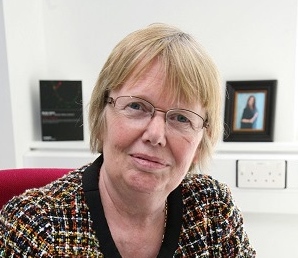
Barbara is an independent consultant and current projects include: completing a book titled No-Nonsense Guide to Project Management for Library and Information Professionals for Facet Publishing; assessment of HEA Principal Fellowship applications; business school accreditations; and delivering workshops on themes such as supporting student learning, developing blended learning, and internationalisation in business schools.
Barbara’s experience is in further and higher education, and particularly business schools where she focused on enhancing learning and teaching, the student experience, and the internationalization and employability agendas. Her qualifications include a doctorate in education on the topic of e-mentoring and women into leadership. Earlier in her career, she worked as a librarian and information professional, and managed workplace and academic libraries.
Previous publications with Facet Publishing include: Blended Learning (2007), Supporting Research Students (2009), The No-Nonsense Guide to Training in Libraries (2013), and Emerging Strategies for Supporting Student Learning (2016). In 2015/16 Barbara developed an online learning resource, Teaching Large Groups, for CILIP. Barbara is a National Teaching Fellow, a Principal Fellow of the HEA, and a Member of CILIP.

Josie Fraser is a Social and Educational Technologist who has worked across education sectors, with governments, commercial service providers and not for profit organisations, developing innovative and effective practice in the use of technology to support learning and teaching. She has long promoted the use of social technologies and networks within education, including convening the International Edubloggers Awards for several years. She has worked on behalf of Childnet International for both Labour and Conservative Governments to deliver UK cyberbullying guidance. Her work developing digital literacy for educators and educational institution has been recognised internationally. Her pioneering work in relation to copyright and open educational resources saw Leicester City Council become the first local government in Europe to provide permission to school staff to openly licence their learning materials, alongside copyright and OER support and training.
Since 2015 she has served as a board member of Wikimedia UK, a charity dedicated to supporting access to knowledge for all, promoting engagement with Wikimedia projects, including Wikipedia, Wiki Data, and the Wikimedia Commons.

Alan Carbery is the Associate Library Director in Champlain College in Vermont, USA, and is responsible for all instructional outreach initiatives through the library, as well as the College’s award-winning, blended program of information literacy instruction. This program reaches every single undergraduate student seven times throughout their undergraduate studies. Prior to moving to the US, Alan worked in a number of academic and special libraries in Ireland.
Alan’s work has focused on information literacy instruction through problem and inquiry-based learning. He’s developed a longitudinal model of meaningful, rubric-based assessment of student learning in information literacy. He’s concerned with reflective practice; how librarians identify and develop as teachers, taking a strengths-based approach to leadership, and most recently in how critical pedagogy and social justice influence our profession.
Alan is currently assisting towards the publication of a forthcoming whitepaper on Global Perspectives on information literacy with ACRL’s Student Learning & Information Literacy committee. He also serves on the editorial board of College & Research Libraries. Alan is the Chair-elect/Vice-Chair of ACRL’s Value of Academic Libraries Committee. During his term as chair in 2017 and 2018, he will lead ACRL’s initiatives in promoting ACRL’s forthcoming action-oriented research agenda with OCLC on library contributions to student learning and success.
Alan’s main pastime is taking far too many photos of beautiful Vermont scenery.

Professor Nicola Whitton is based at the Education and Social Research Institute at Manchester Metropolitan University. Her research focuses on digital innovation in learning and teaching and, in particular, games and learning in the context of Higher Education. Her research interests include interaction design, the impact of motivation and engagement, active learning design, and the pedagogy of play. She has led research projects in gaming for older adults, collaborative game building as a learning approach, alternate reality games for student induction and information literacy, and her most recent project investigates the impact of game-based neuroscience-informed pedagogy on science learning. Her first book, Learning with Digital Games, based on her PhD thesis, was published in 2010, and her more recent book, Digital Games and Learning: Research and Theory (2014), has received considerable international attention.

Alex is a National Teaching Fellow, and an Educational Designer and University Teaching Fellow at the University of Leicester, where he has had long experience as both practitioner and researcher of course design and development for higher education. He has particular interests in online and distance education, student engagement, and provision of effective research skills and student induction. His principal research area is in games based learning; he recently co-authored Using Games to Enhance Teaching and Learning (Routledge, 2012) and New Traditional Games for Learning: A Case Book (Routledge, 2013) and has suggested key features of online immersive games which can be transferred to higher education to ensure high engagement and community development. He was part of the team behind the first charity Alternative Reality Game, Operation: Sleeper Cell, co-chairs the Association for Learning Technology special interest group on Games and Learning, and co-organises the Let’s Change the Game cross-sector conference.
.jpg)
James Clay is currently on a 12 month contract with Jisc as their project manager for the building digital capability R&D project.
James has worked in the further education (FE) sector since 1993 (as well as a short time in the museum sector) and has extensive experience in the use of technology to enhance and enrich learning.
He has been a teacher, a project director, an ILT manager, Learning Resources manager and an IT director.
He has managed a range of projects over the years in various roles, including mobile learning, e-books, IT infrastructure, learner analytics, copyright, institutional resources, VLEs and student records.
.jpg)
Early riser, devoted oceanite, and advocate of radical neutrality, Char Booth explores the integration of pedagogy, research, technology, and design in libraries.
Char is Associate Dean of the Library at California State University San Marcos, the youngest campus in the CSU system with a strong focus on social justice and educating traditionally underrepresented learners. Char was previously the Director of Research, Teaching, and Learning Services at the Claremont Colleges Library, has held positions at the University of California at Berkeley and Ohio University.
Char is a faculty member of the ACRL Information Literacy Immersion Institute, blogs periodically at info-mational, tweets infrequently @charbooth, and her publications include the Ilene F. Rockman Instruction Publication of the Year-winning Reflective Teaching, Effective Learning: Instructional Literacy for Library Educators (ALA Editions, 2011) and Informing Innovation: Tracking Student Interest in Emerging Library Technologies (ACRL, 2009).
 Julia has worked for the TUC unionlearn in a National role since 2009. Unionlearn assists and supports unions to develop partnership approaches to ensure they can make an effective contribution to workforce development as well as addressing individual learning needs. Because unions have a place of trust and confidence in the workplace they are well placed to reach those workplaces and groups of workers others find hard to reach. Partnerships with employers, providers and agencies are fundamental to this approach. The Union Learning Fund is managed and administered by unionlearn, under an agreement with the Department for Business, Innovation and Skills which Julia is responsible for and currently oversees a budget of £14 million. Julia’s most recent background is in Education and training, especially working with people from disadvantaged backgrounds.
Julia has worked for the TUC unionlearn in a National role since 2009. Unionlearn assists and supports unions to develop partnership approaches to ensure they can make an effective contribution to workforce development as well as addressing individual learning needs. Because unions have a place of trust and confidence in the workplace they are well placed to reach those workplaces and groups of workers others find hard to reach. Partnerships with employers, providers and agencies are fundamental to this approach. The Union Learning Fund is managed and administered by unionlearn, under an agreement with the Department for Business, Innovation and Skills which Julia is responsible for and currently oversees a budget of £14 million. Julia’s most recent background is in Education and training, especially working with people from disadvantaged backgrounds.
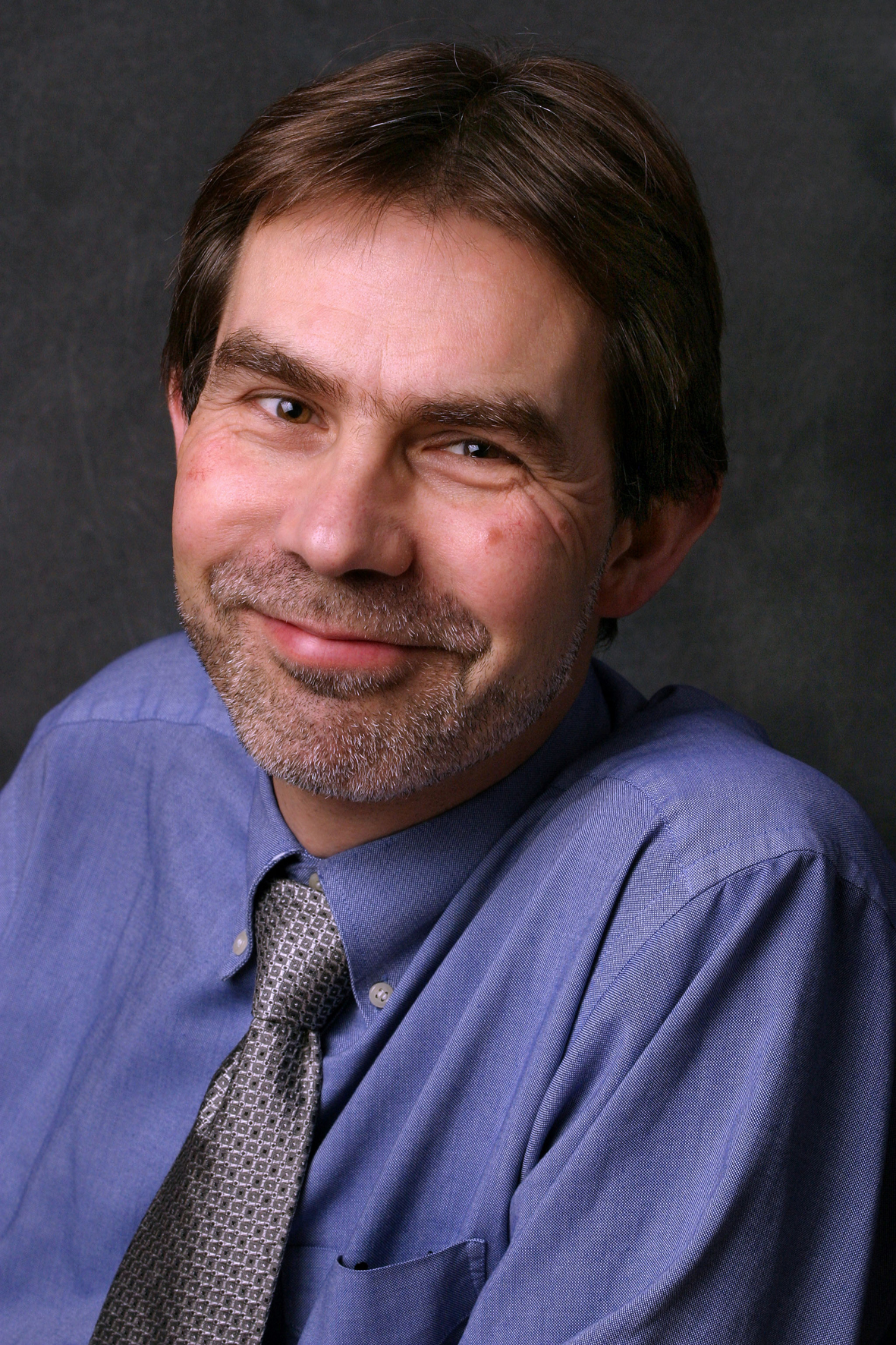 Tom was appointed Director of unionlearn – the education, learning and skills organisation of the TUC – in July 2009. Prior to that, Tom had been Head of the Organisation and Services Department at the Trades Union Congress (TUC) from July 2003.
Tom was appointed Director of unionlearn – the education, learning and skills organisation of the TUC – in July 2009. Prior to that, Tom had been Head of the Organisation and Services Department at the Trades Union Congress (TUC) from July 2003.
Tom was previously head of NATFHE’s Universities Department for five years, having before that been Head of Research and then Assistant General Secretary at the Association of University Teachers from 1988. His other experience includes two years in employment research, with Incomes Data Services (a publishing house specialising in employment publications), and then five years with the GMB (the UK’s fourth largest trade union). Tom was also the National Trade Union Liaison Officer for the Labour Party (1986 – 1988).
Tom has an MA in Industrial Relations from Warwick University (1978-79) and a Diploma in Social Administration from York University. His first degree was in Philosophy from St Andrews University. In 1996 Tom gained a postgraduate Certificate in Employment Law from Middlesex University.
A fellow of the Institute of Personnel and Development, the professional institute for management involved in personnel and staff development, Tom has written on unions, education and industrial relations for newspapers, magazines, campaigning organizations and academic publications.
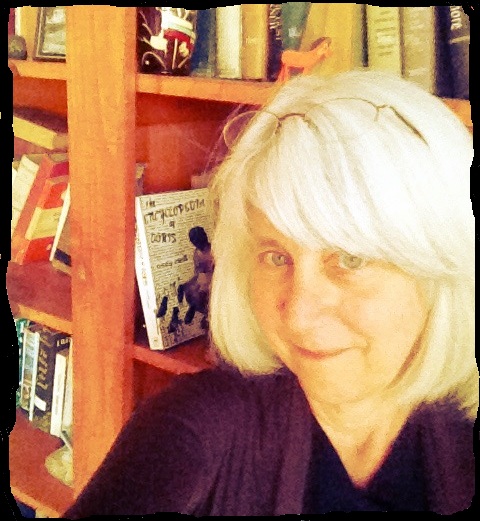 Barbara Fister has coordinated instruction at the Gustavus Adolphus College library in St. Peter, Minnesota, for over 25 years, but is still learning how to help students learn. She has studied students’ research processes, examined the relationship between writing and research, and has taught a course on how information works for students planning to go on to graduate education for nearly ten years.
Barbara Fister has coordinated instruction at the Gustavus Adolphus College library in St. Peter, Minnesota, for over 25 years, but is still learning how to help students learn. She has studied students’ research processes, examined the relationship between writing and research, and has taught a course on how information works for students planning to go on to graduate education for nearly ten years.
Another of her interests is the future of publishing. She has written widely on open access to scholarship, is participating in an exploration of publishing open access books through a library collaborative, has used PressBooks to publish an anthology of faculty writing, and is a founding editor of the new Journal of Creative Library Practice. Drawing these two interests together, she is exploring ways the library can support learning experiences that position students as creators of public knowledge.
Popular literacy practices and the role of reading in everyday life is another thread of her work. Currently she is studying online reading communities and has been pleased to participate from afar with the AHRC-funded Digital Reading Network based at Bournemouth University. She also writes fiction, having published three mysteries.
You can follow Barbara’s generalist tendencies on Twitter and through her regular posts for Library Journal’s Peer to Peer Review and her Library Babel Fish blog at Inside Higher Ed.
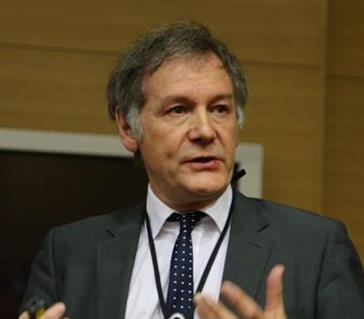 Ray Land is Professor of Higher Education at Durham University and Director of Durham’s Centre for Academic Practice. He previously held similar positions at the Universities of Strathclyde, Coventry and Edinburgh. He has been a higher education consultant for the OECD and the European Commission and has recently been involved in two European Commission higher education projects in Europe and Latin America.
Ray Land is Professor of Higher Education at Durham University and Director of Durham’s Centre for Academic Practice. He previously held similar positions at the Universities of Strathclyde, Coventry and Edinburgh. He has been a higher education consultant for the OECD and the European Commission and has recently been involved in two European Commission higher education projects in Europe and Latin America.
He has published widely in the field of educational research, including works on educational development, learning technology and quality enhancement. He is best known for his theory (with Jan Meyer) of Threshold Concepts and Troublesome Knowledge. His latest book (with George Gordon) is Enhancing Quality in Higher Education: International Perspectives (Routledge 2013).
 Alison J. Head, Ph.D. is a Research Scientist in the University of Washington’s Information School and a Faculty Associate at the Berkman Center for Internet and Society at Harvard University. She is the founder and director of Project Information Literacy (PIL), an ongoing research study in the US that has investigated how college students conceptualize and operationalize research tasks for course work and “everyday life” use. Since 2008, Alison and her team of PIL researchers have interviewed and surveyed over 13,000 undergraduates at 57 US four-year public and private universities and colleges and two-year community colleges. In 2013, Library Journal named PIL one of the “Big Four Research Studies” about library users.
Alison J. Head, Ph.D. is a Research Scientist in the University of Washington’s Information School and a Faculty Associate at the Berkman Center for Internet and Society at Harvard University. She is the founder and director of Project Information Literacy (PIL), an ongoing research study in the US that has investigated how college students conceptualize and operationalize research tasks for course work and “everyday life” use. Since 2008, Alison and her team of PIL researchers have interviewed and surveyed over 13,000 undergraduates at 57 US four-year public and private universities and colleges and two-year community colleges. In 2013, Library Journal named PIL one of the “Big Four Research Studies” about library users.
Alison’s research about college students has resulted in seven open-access PIL research reports and five peer-reviewed journal articles. Five of these reports were co-authored with Michael B. Eisenberg, co-founder with the “Big6” information literacy model and Dean Emeritus and Professor at the University of Washington’s Information School. PIL has also produced learning tools (e.g., videos, infographics, podcasts, “Smart Talk” interviews, and “Practical PIL” page showcasing innovative library projects) that have stimulated awareness of and engagement in PIL’s highly visible research activities. Articles about PIL have appeared in The Atlantic Magazine, The Huffington Post, The Chronicle of Higher Education, Education Week, Inside Higher Education, Library Journal, and The Seattle Times.
In 2012, PIL launched “The PIL Passage Studies,” a unique series of in-depth investigations about young adults and the critical information transitions they experience in their lives. PIL released its first Passage Study about the information-seeking behavior of college graduates entering the workplace. In 2013, PIL’s followed this study with its research on about how high school students make the information transition to college.
Alison has a Ph.D. in library and information science from the University of California at Berkeley and was a Visiting Scholar in Symbolic Systems at Stanford University. Her research on today’s students and their information practices began with a small study at Saint Mary’s College of California, where she taught new media as the Roy O. Disney Visiting Professor in New Media for 10 years. Currently, Alison is leading a large-scale national study about lifelong learning and recent college graduates. This two-year study is being conducted in partnership with the Information School at the University of Washington and has been funded by a National Leadership Grant from the Institute of Museum and Library Services (IMLS), a federal agency creating strong libraries and museums that connect people to information and ideas.
More about Dr. Head’s research and PIL is available at: http://projectinfolit.org/.
 Bill Thompson has been working in, on and around the Internet since 1984 and spends his time thinking, writing and speaking about the ways digital technologies are changing our world. A well-known technology journalist, he is Head of Partnership Development in the BBC’s Archive Development Group, building relationships with museums, galleries and other institutions around ways to make archive material more accessible, and a Visiting Professor at the Royal College of Art.
Bill Thompson has been working in, on and around the Internet since 1984 and spends his time thinking, writing and speaking about the ways digital technologies are changing our world. A well-known technology journalist, he is Head of Partnership Development in the BBC’s Archive Development Group, building relationships with museums, galleries and other institutions around ways to make archive material more accessible, and a Visiting Professor at the Royal College of Art.
Bill appears weekly on Click on BBC World Service radio, writes a monthly column for Focus magazine and is an advisor to a range of arts and cultural organisations on their digital strategies. He is a member of the board of Writers’ Centre Norwich and of the Collections Trust, and was for many years a Trustee of the Cambridge Film Trust. He built and manages the Working for an MP website.
During the 1990’s Bill was Internet Ambassador for PIPEX, the UK’s first commercial ISP where he developed websites for Comic Relief, the Edinburgh Fringe and Anne Campbell MP, before moving to Guardian Newspapers as head of new media. He established the paper’s first website in 1994 and was responsible for many online projects including Eurosoccer.com in 1996.
 Kate has over 25 years’ experience providing and managing the delivery of specialist information and research services (both virtual and library based) to a wide variety of users. She is based in the UK, and has worked across a number of sectors, including the media (BBC and a national newspaper), health care, and voluntary sector (Cancer Research UK, National Children’s Bureau and Macmillan Cancer Support).
Kate has over 25 years’ experience providing and managing the delivery of specialist information and research services (both virtual and library based) to a wide variety of users. She is based in the UK, and has worked across a number of sectors, including the media (BBC and a national newspaper), health care, and voluntary sector (Cancer Research UK, National Children’s Bureau and Macmillan Cancer Support).
Currently Kate is Information and Support Programme Lead at Macmillan Cancer Support, where she oversees the charity’s information and support strategy and innovations to support people affected by cancer. In 2012 Kate worked at the National Children’s Bureau (NCB) as Interim Information Manager where she developed and implemented a new strategy for the library. From 2008-2012 Kate was director of patient information at Cancer Research UK, with responsibility for the charity’s information services to people affected by cancer. These included a telephone helpline, website, and online forum. Before joining Cancer Research, Kate was head of health information at NHS Direct, where she managed a variety of teams providing health information via the telephone, websites and digital television. From 1989-2003, Kate worked for the BBC in a variety of information roles, including managing the development of a virtual research intranet site in 2000 and providing research support to journalists and program makers.
Kate is the 2014 President of the Special Libraries Association (SLA). She is the first non-North American to lead this international association. SLA has 8,000 members in 75 countries and includes information professionals in the corporate, academic and government information sectors. It promotes and strengthens its members through learning, advocacy and networking initiatives.
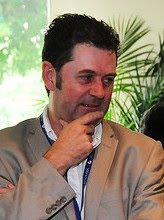 Steve Wheeler is Associate Professor of Learning Technologies at Plymouth University, in South West England. Originally trained as a psychologist, he has spent his entire career working in media, technology and learning, predominantly in nurse education (NHS 1981-1995) and teacher education and training (1976-1981 and 1995-present). He is now in the Faculty of Health, Education and Society.
Steve Wheeler is Associate Professor of Learning Technologies at Plymouth University, in South West England. Originally trained as a psychologist, he has spent his entire career working in media, technology and learning, predominantly in nurse education (NHS 1981-1995) and teacher education and training (1976-1981 and 1995-present). He is now in the Faculty of Health, Education and Society.
A trained educator, he teaches on a number of undergraduate and post-graduate teacher education programmes. He specialises in research on e-learning and distance education, with particular emphasis on social media and Web 2.0 tools. He is regularly invited to speak about his work and has given keynotes and invited lectures to audiences in over 20 countries across 5 continents. He is currently involved in several research programmes related to e-learning, social media and handheld technologies.
Steve is the author of more than 150 scholarly articles and is an active and prolific edublogger. His blog Learning with ‘e’s is a regular online commentary on the social and cultural impact of disruptive technologies, and the application of digital media in education and training.
Steve is chair of the Plymouth e-Learning Conference, and between 2008-2011 was also co-editor of the journal Interactive Learning Environments. He serves on the editorial boards of a number of learning technology and education related open access academic journals including Research in Learning Technology (formerly ALT-J), the International Review of Research in Open and Distance Learning and Digital Culture and Education.
In 2008 Steve was awarded a Fellowship by the European Distance and E-learning Network (EDEN), and in 2011 he was elected to serve as a member of the Steering group of EDEN’s Network of Academics and Professionals (NAP). He is also chair of the influential worldwide research group IFIP Technical Committee Working Group 3.6 (distance education) and is author of several books including The Digital Classroom (Routledge: 2008) and Connected Minds, Emerging Cultures (Information Age: 2009). He lives in Plymouth, in the South West of England, with his wife and three children.
 Rangaswami joined salesforce.com in November 2010 as salesforce.com’s first Chief Scientist. He is tasked with the responsibility of contributing to salesforce.com’s product strategy and ensuring that the benefits of cloud computing are being promoted globally.
Rangaswami joined salesforce.com in November 2010 as salesforce.com’s first Chief Scientist. He is tasked with the responsibility of contributing to salesforce.com’s product strategy and ensuring that the benefits of cloud computing are being promoted globally.
Prior to joining, Rangaswami spent four years at BT in London, most recently as Chief Scientist of the BT Group. He brings over 30 years’ of technology experience to salesforce.com with large multinational companies. This includes holding the role of global chief information officer at investment bank Dresdner Kleinwort Wasserstein, which he joined in 1997. While there, he established his reputation for innovation within the enterprise, culminating in a series of Harvard Business Review case studies. Rangaswami has also held a variety of leadership and technology positions at Burroughs Corp., Data General and Hoskyns Group.
Rangaswami is chairman of School of Everything, an educational start-up that teaches a broad range of socially focused topics via the web. He is also a venture partner at Anthemis Group.
Rangaswami is a Fellow of the British Computer Society, a Fellow of the Royal Society of the Arts and is a Chartered IT Professional of the British Computer Society. He is also Chair of MetaCert, a San Francisco based company that provides products and services to help protect children from unsuitable content on the web.
He writes a popular blog called Confused of Calcutta, and contributed a guest chapter to The Cluetrain Manifesto, a best-selling business book.
He holds a Bachelor’s degree in Economics and Statistics from St. Xavier’s College, University of Calcutta.
 Ms Irmgarda Kasinskaite-Buddeberg is a programme specialist working at United Nations Educational, Scientific and Cultural Organization (UNESCO), Communication and Information Sector, Knowledge Societies Division in Paris, France. She is in charge of the programmes and projects related to the implementation of the UNESCO’s Communication and Information Strategy on Media and Information Literacy, innovative application of Information and Communication Technologies (ICTs) and Persons with Disabilities with a special focus on the implementation of the United Nations Convention on the Rights of Persons with Disabilities, and multilingualism in cyberspace, particularly to the promotion of the normative instrument “UNESCO Recommendation concerning the Promotion and Use of Multilingualism and Universal Access to Cyberspace”. During more than ten years at UNESCO, she also carried out projects on HIV and AIDS issues and was involved in UNESCO’s response within WSIS framework. She contributed to the preparation of several publications, reports and articles on wide range of issues.
Ms Irmgarda Kasinskaite-Buddeberg is a programme specialist working at United Nations Educational, Scientific and Cultural Organization (UNESCO), Communication and Information Sector, Knowledge Societies Division in Paris, France. She is in charge of the programmes and projects related to the implementation of the UNESCO’s Communication and Information Strategy on Media and Information Literacy, innovative application of Information and Communication Technologies (ICTs) and Persons with Disabilities with a special focus on the implementation of the United Nations Convention on the Rights of Persons with Disabilities, and multilingualism in cyberspace, particularly to the promotion of the normative instrument “UNESCO Recommendation concerning the Promotion and Use of Multilingualism and Universal Access to Cyberspace”. During more than ten years at UNESCO, she also carried out projects on HIV and AIDS issues and was involved in UNESCO’s response within WSIS framework. She contributed to the preparation of several publications, reports and articles on wide range of issues.
Before joining UNESCO in 2002, she worked as Senior Programme Specialist, Department of Information and Informatics, Ministry of Public Administration Reforms and Local Authorities, Lithuania.
She obtained her Doctor’s Degree in Humanitarian Sciences, Communication and Information from Vilnius University (2006), Master’s Degree in Information Management (1999) from Vilnius University and Bachelor of Arts degree (1996) from Vilnius Academy of Arts (Lithuania). As a visiting researcher, she conducted research in Lund University (Sweden, 1999), Helsinki University (2000) and Helsinki Technology University (2001).
 David Puttnam spent thirty years as an independent producer of award-winning films including The Mission, The Killing Fields, Local Hero, Chariots of Fire, Midnight Express, Bugsy Malone and Memphis Belle. His films have won ten Oscar’s, 25 Bafta’s and the Palme D’Or at Cannes.
David Puttnam spent thirty years as an independent producer of award-winning films including The Mission, The Killing Fields, Local Hero, Chariots of Fire, Midnight Express, Bugsy Malone and Memphis Belle. His films have won ten Oscar’s, 25 Bafta’s and the Palme D’Or at Cannes.
From 1994 to 2004 he was Vice President and Chair of Trustees at the British Academy of Film & Television Arts (BAFTA) and was awarded a BAFTA Fellowship in 2006.
He retired from film production in 1998 to focus on his work in public policy as it relates to education, the environment, and the ‘creative and communications’ industries. In 1998 he founded the National Teaching Awards, which he chaired until 2008, also serving as the first Chair of the General Teaching Council from 2000 to 2002. From July 2002 to July 2009 he was president of UNICEF UK, playing a key role in promoting UNICEF’s key advocacy and awareness objectives.
David is the present Chancellor of the Open University, following ten years as Chancellor of The University of Sunderland. He is President of the Film Distributors’ Association, Chairman of The Sage Gateshead, Deputy Chairman of Channel Four, Deputy Chairman of Profero and a trustee of the Eden Project.
He was founding Chair of the National Endowment for Science, Technology and the Arts (NESTA) and for ten years chaired the National Museum of Photography, Film and Television. He has also served as a trustee of the Tate Gallery and the Science Museum.
In 2007 he served as Chairman of the Joint Parliamentary Committee on the Draft Climate Change Bill, having performed the same role on the 2002 Communications Bill. He has also been Chairman of two Hansard Society Commission Reports on the relationship between Parliament and the Public; he serves as Senior Non-Executive Director on two public companies.
David was awarded a CBE in 1982, a knighthood in 1995 and was appointed to the House of Lords in 1997. In France he was made a Chevalier of the Order of Arts and Letters in 1985, becoming an Officer in 1992, and a Commander in 2006. He has been the recipient of more than 40 honorary degrees from Universities in the UK and overseas.
 Tara Brabazon is Professor of Communication in the Faculty of Social Science and Humanities at the University of Ontario Institute of Technology (UOIT), and Fellow of the Royal Society for the encouragement of Arts, Manufactures & Commerce (RSA).
Tara Brabazon is Professor of Communication in the Faculty of Social Science and Humanities at the University of Ontario Institute of Technology (UOIT), and Fellow of the Royal Society for the encouragement of Arts, Manufactures & Commerce (RSA).
Previously, Tara has held academic positions in the United Kingdom, Australia and Aotearoa/New Zealand. An outstanding teacher, she won six teaching awards, including the Australian National Teaching Award for the Humanities in 1998, along with others in the areas of disability and cultural studies. In 2005, Tara won both the Murdoch University Postgraduate Supervisor of the Year and the Teaching Excellence Award. In 2009 and she won the University of Brighton’s Teaching Excellence Award, nominated by both undergraduate and postgraduate students. She was a finalist for the 2005 Australian of the Year and also the 2005 Telstra Businesswoman of the Year in the Community Service category. In 1999 and 2002, she was short-listed for the Western Australian Citizen of the Year.
Tara’s best known research is in the areas of online education and media literacies, popular cultural studies, creative industries and city imaging and sonic media. At the moment, Tara is running three clustered research projects. Firstly, she is continuing her research into online education. The current manifestation of this work, following her two books Digital Hemlock and The University of Google, is titled Digital Dieting: moving from information obesity to digital fitness. Her second area of research explores orality, aurality and sonic media, investigating the role of sound-only media in creating political defamiliarization and social change. Tara’s third sphere of research connects her interest in city imaging and social media to explore how geosocial networking, through such applications as FourSquare and Groupon, can become part of a strategy for urban regeneration and social development. Downtown Oshawa is an important case study for this research.
 Megan Oakleaf is an Assistant Professor in the iSchool at Syracuse University where she teaches “Reference and Information Literacy Services” and “Planning, Marketing, and Assessing Library Services.” Her research interests include library value and impact, outcomes assessment, evidence-based decision making, information literacy instruction, information services, and digital librarianship. She is the author of the Value of Academic Libraries Comprehensive Report and Review and is on the faculty of the ACRL Immersion Program.
Megan Oakleaf is an Assistant Professor in the iSchool at Syracuse University where she teaches “Reference and Information Literacy Services” and “Planning, Marketing, and Assessing Library Services.” Her research interests include library value and impact, outcomes assessment, evidence-based decision making, information literacy instruction, information services, and digital librarianship. She is the author of the Value of Academic Libraries Comprehensive Report and Review and is on the faculty of the ACRL Immersion Program.
Megan has presented at numerous conferences, including ALA, ACRL, and AAC&U National Conferences, ARL Library Assessment Conferences, the IUPUI Assessment Institute, the NCSU Undergraduate Assessment Symposium, the Texas A&M Assessment Conference, and EDUCAUSE. Megan won the 2011 Ilene F. Rockman Publication of the Year Award, was named to the LIRT Top 20 Instruction Articles three times, was included on the 2010 Reference Research Review List, and was awarded “Best Paper” at the 2007 EBLIP Conference. She has published articles in JASIST, College & Research Libraries, Journal of Documentation, Communications in Information Literacy, Library Quarterly, and Portal, among other journals.
Previously, Megan was the Librarian for Instruction and Undergraduate Research at North Carolina State University. In this role, she designed, implemented, coordinated, and assessed the library instruction program. She trained fellow librarians in instructional theory and methods; spearheaded development of the LOBO tutorial, a modular information literacy tutorial for first-year students and winner of the ALA/Information Today “Library of the Future” Award; served on the Committee on Undergraduate Education; and provided library instruction to the First Year Writing Program, First Year College, Honors Program, and Department of Communication.
Megan completed her dissertation entitled, “Assessing Information Literacy Skills: A Rubric Approach,” at the School of Information and Library Science at the University of North Carolina at Chapel Hill. She earned her MLS from Kent State University and also holds a BA in English and Spanish and a BS in English Education and Spanish Education from Miami University. Prior to a career in librarianship, Megan taught language arts and advanced composition in Ohio public schools, grades 8-12.
David is Director of the Department of Information Studies at University College London, London’s I-School and the biggest information school in the UK. He is also the Director of the UCL Centre for Publishing and the CIBER research group. Previously, he was Head of the Department of Information
Science, City University. Research interests largely concern mapping behaviour in virtual spaces, the virtual scholar, and the Google Generation.
Together with Al Gore, Stephen Fry and Sir Tim Berners-Lee (amongst others) he (and CIBER) had a starring role in the BBC’s Television Series, The Virtual Revolution.
Nikki Heath has been working in libraries since the age of 11. She has a BA (Hons) in Library and Information Studies, and has worked in college, public, school and school library service libraries over the past 27 years.
Passionate about encouraging reading for pleasure, Nikki works with a great team of staff at Werneth School in Stockport to get students reading in unusual and different ways. She teaches fortnightly library lessons for all year sevens and eights, combining Information Literacy with the Accelerated Reader programme.
Nikki was Awarded the title of School Librarian of the Year in 2008 and is currently an SLA committee member.
Co-author of the Mexican Information Literacy Standards for Higher Education, author of the IFLA International Guidelines on Information Literacy for Life-Long Learning now available in seven languages, editor of the just released book Information Literacy: International Perspectives (K.G.Saur), and published other books and papers, including the co-authored (Ralph Catts) Towards Information Literacy Indicators: A Conceptual Framework Paper”, written for and published by UNESCO, 2008. Coordinator of the UNESCO-funded projects of InfoLit/IFLA: a) the web-based International Information Literacy Resources Directory, b) the International Information Literacy State of the Art Report, and also coordinator of the c) IL International Logo Contest, all available at http://www.infolitglobal.info/. He is Director of the University of Veracruz (Universidad Veracruzana) / USBI Library and Coordinator of the UV Virtual Library in Veracruz, México. He has a Master’s Degree in Library Science at Denver University and has a Ph.D. in Information Science from Sheffield University, England.
LILAC is great opportunity for our fellow professionals to present their ideas, share best practice and show case new thinking in our sector. If you have an idea then we'd love to hear about it. We have many options for the types of sessions you might run from a symposium to a workshop. Visit our Call for Presentations page to find out how to apply.
Places at this year's conference are likely to be in demand more than ever before. Each year our conference grows increasingly popular and this year promises to be no different. Don't miss out and book your place now for this year's conference.
We look forward to seeing you there!
